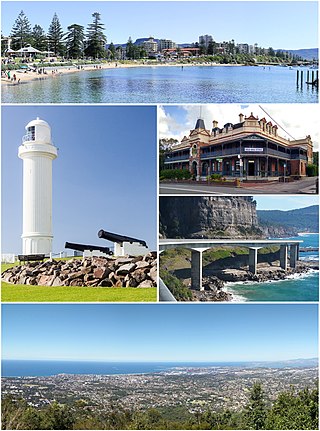
Wollongong, colloquially referred to as The Gong, is a city located in the Illawarra region of New South Wales, Australia. The name is believed to originate from the Dharawal language, meaning either 'five islands/clouds', 'ground near water' or 'sound of the sea'. Wollongong lies on the narrow coastal strip between the Illawarra Escarpment and the Pacific Ocean, 85 kilometres south of central Sydney. Wollongong had an estimated urban population of 302,739 at June 2018, making it the third-largest city in New South Wales after Sydney and Newcastle and the tenth-largest city in Australia by population. The city's current Lord Mayor is Gordon Bradbery AM who was elected in 2021.
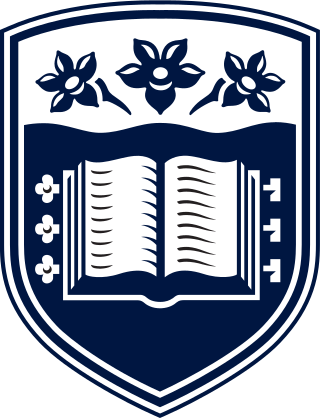
The University of Wollongong is an Australian public research university located in the coastal city of Wollongong, New South Wales, approximately 80 kilometres south of Sydney. As of 2023, the university had an enrolment of more than 33,000 students, an alumni base of more than 176,000 [LC1] and over 2,400 staff members including 16 Distinguished professors.

Willy Susilo is an Australian cybersecurity scientist and cryptographer. He is a Distinguished Professor at the School of Computing and Information Technology, Faculty of Engineering and Information Sciences University of Wollongong, Australia.
Sharon Beder is an environmentalist and former professor in the Faculty of Arts at the University of Wollongong in New South Wales, Australia. Her research has focused on how power relationships are maintained and challenged, particularly by corporations and professions. She has written 11 books, and many articles, book chapters and conference papers, as well as designing teaching resources and educational websites.

Vanessa "Van" Badham is an Australian writer and activist. A playwright and novelist, she writes dramas and comedies. She is a regular columnist for the Guardian Australia website.
Gordon Wallace, AO, FAA, FTSE, FRACI is a leading scientist in the field of electromaterials. His students and collaborators have pioneered the use of nanotechnology in conjunction with organic conductors to create new materials for energy conversion and storage as well as medical bionics. He has developed new approaches to fabrication that allow material properties discovered in the nano world to be translated into micro structures and macro scopic devices.
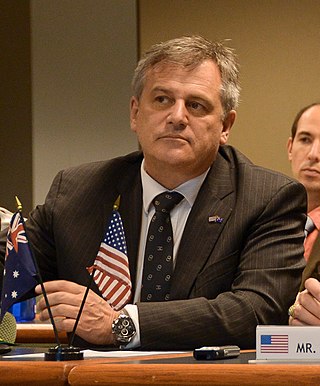
Alexander ‘Alex’ Zelinsky, is an Australian computer scientist, systems engineer and roboticist. His career spans innovation, science and technology, research and development, commercial start-ups and education. Zelinsky is vice-chancellor and president of the University of Newcastle joining the university in November 2018. He was the Chief Defence Scientist of Australia from March 2012 until November 2018. As Chief Defence Scientist he led defence science and technology for Australia's Department of Defence.
Beverly Derewianka is Emeritus Professor of linguistics at the University of Wollongong, Australia. She is a leading figure in educational linguistics and Sydney School genre pedagogy. Her major research contributions have been in the field of literacy education. Her research projects tracing students’ literacy development have had a direct and substantial impact on curriculum and syllabus development in Australia and internationally. She has (co-)authored 11 books and numerous book chapters and journal articles in the field of literacy education.

The Illawarra Health and Medical Research Institute (IHMRI) is an independent health and medical research institute based in Wollongong, New South Wales.
The Illawarra Folk Festival started in 1985 in Jamberoo, New South Wales. It has grown to become one of the largest festivals in Australia run entirely by volunteers from the Illawarra Folk Club Inc.
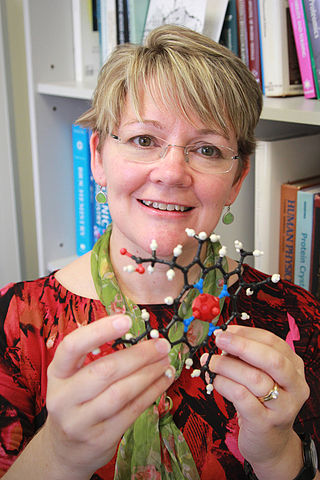
Professor Jennifer Louise "Jenny" Martin is an Australian scientist, academic, and was recently the Deputy Vice-Chancellor at the University of Wollongong, in New South Wales. She is a former Director of the Griffith Institute for Drug Discovery at Griffith University. and a former Australian Research Council Laureate Fellow at the Institute for Molecular Bioscience, University of Queensland. Her research expertise lies in the areas of structural biology, protein crystallography, protein interactions and their applications in drug design and discovery.

Dion's Bus Service is an Australian bus company operating services in Wollongong.

Roslyn Judith "Judy" Wilyman is an Australian anti-vaccination activist who came to prominence following the controversial award of a humanities PhD titled "A critical analysis of the Australian government's rationale for its vaccination policy" by University of Wollongong. The thesis came under heavy criticism from multiple directions, including medical professionals, due to claims within the thesis, including advancing a conspiracy theory whereby the World Health Organization (WHO) and the pharmaceutical industry supposedly conspire to promote vaccinations in the absence of evidence of safety and efficacy. The awarding of the degree created questions about the standards being applied and whether or not the thesis supervisors and examiners had sufficient knowledge to oversee the research, and led to calls for the university to review the doctorate. A number of individuals and medical organisations – including academics and researchers from other parts of the University of Wollongong – spoke out against the findings of the thesis, emphasising the need for vaccinations in order to prevent serious disease; and the University of Wollongong was criticised for a perceived lack of transparency in their doctoral process and an alleged failure to uphold standards of scholarship.
Justin John Yerbury was an Australian molecular biologist who was spurred to follow a career in biological research when he discovered his family has the genetic form of motor neurone disease (MND). He held the position of Professor in Neurodegenerative Disease at the University of Wollongong. He was diagnosed with MND himself in 2016, but continued to research until his death from the disease in 2023.

Margaret Mary Sheil is an Australian academic and the Vice Chancellor and President of Queensland University of Technology.
Felicity Meakins is a linguist specialising in Australian Indigenous languages, morphology and language contact, who was one of the first academics to describe Gurindji Kriol. As of 2022, she is a professor at the University of Queensland and Deputy Director of the University of Queensland node of the Australian Research Council (ARC) Centre of Excellence for the Dynamics of Language. She holds an ARC Future Fellowship focusing on language evolution and contact processes across northern Australia.
The Australian Laureate Fellowship is an Australian professorial research fellowship awarded by the Australian Research Council. Fellows are chosen each year for five-year awards. In 2023 8 industry-focused Laureate Fellowships were awarded for the first time.
Judy Agnes Raper is an Australian chemical engineer and was previously Deputy Vice-Chancellor for Research and Innovation at the University of Wollongong. She has served as a National Science Foundation Director and led the Atomic Energy Research Establishment. She has been Dean & CEO of TEDI-London, a new engineering higher education provider since its incorporation in June, 2019.
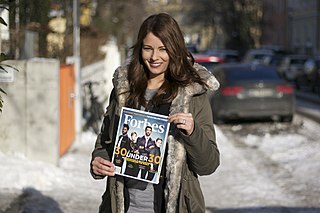
Dr. Natalie Matosin is an Australian scientist known for research into the impacts of stress and its role in mental illness. Matosin's research has been published in prestigious academic journals, as well as on The Conversation. Matosin spoke at TEDx Hamburg in June 2017 and is the 2021 Al & Val Rosenstrauss Fellow. She was previously a National Health and Medical Research Council CJ Martin Early Career Research Fellow, and Alexander von Humboldt Fellow.














